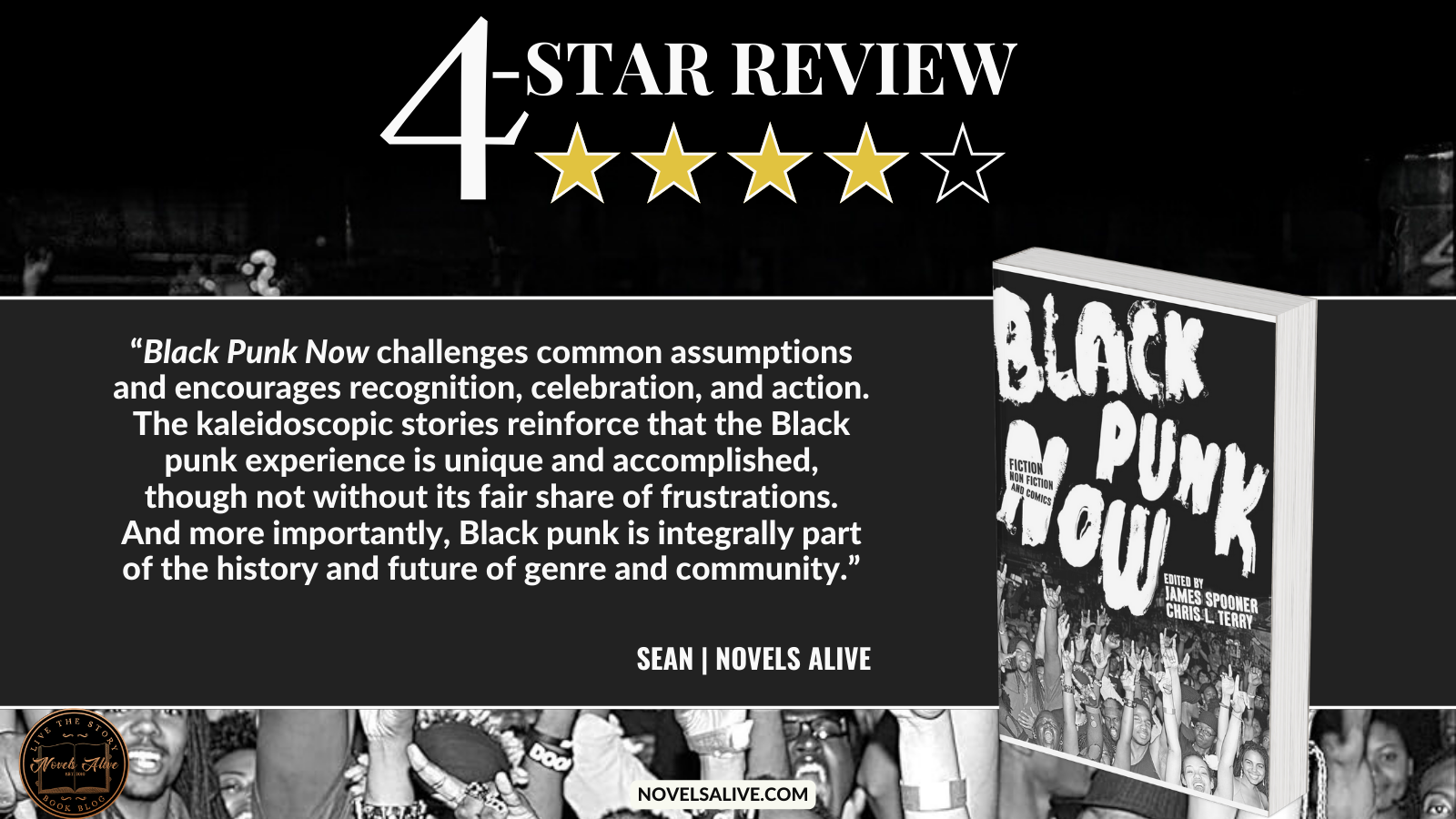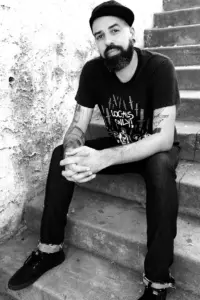

Publication Date: October 31, 2023
A canonizing, bold, and urgent anthology setting a new precedent for Black Punk Lit, created by generations of Black punks—featuring both new voices and those from the not-so-recent past
Black Punk Now is an anthology of contemporary nonfiction, fiction, illustrations, and comics that collectively describe punk today and give punks—especially the Black ones—a wider frame of reference. It shows all of the strains, styles, and identities of Black punk that are thriving, and gives newcomers to the scene more chances to see themselves.
Curated from the perspective of Black writers with connections to the world of punk, the collection mixes media as well as generations, creating a new reference point for music-lovers, readers, and historians by capturing the present and looking towards the future. With strong visual elements integrated throughout, this smart, intimate collection is demonstrative of punk by being punk itself: underground, rebellious, aesthetic but not static—working to decenter whiteness by prioritizing other perspectives.
Edited by graphic novelist and filmmaker James Spooner, and author Chris L. Terry, contributors to the collection include critic Hanif Abdurraqib and Mars Dixon, conversations with Brontez Purnell, and a roundtable of all femme festival organizers.

I grew up listening to punk rock in a small town in Idaho. Among the railroad tracks and Mormon churches scattering the arid valley, I searched elsewhere to construct my teenage identity, somewhere to channel my skepticism, anger, and curiosity. I scoured my CD liner notes to see what shirts my favorite bands wore, hoping to find new music. I lost myself in live videos and interviews, reveling in Joe Strummer’s snarl, Jello Biafra’s sly, maniacal grin, and Henry Rollins’ unapologetic charisma on stage and off. Though there wasn’t much of a punk community where I lived, I found comfort in the music I listened to, my heart pumping quicker to the rapid-fire snare and my lips curling when singing along. Punk rock provided a blueprint for who I was and wanted to be, not just in how I dressed or did my hair but in my philosophy and personality.
Punk rock was a refuge for me, where the deviants could feel part of a community, something larger than themselves. And yet, despite rock ‘n’ roll’s beginnings stemming from Black musicians, when looking through the canon of punk rock, you’ll mainly see white faces—the Sex Pistols, the Clash, and the Ramones. So, is punk rock as inclusive as it claims to be? What do communities of color have to sacrifice to belong? Or, how can Black punks make the subculture their own?
James Spooner and Chris L. Terry aim to explore these questions in Black Punk Now while exalting and celebrating Black punk musicians who have shaped the genre and continue to open the punk community up for creativity and expression.
The book resembles a punk zine—a collection of essays, short stories, comics, and interviews (and if you’re unfamiliar with the “zine” form, Golden Sunrise Collier’s essay brilliantly discusses how independent publishing, from abolitionist pamphlets to punk publications, serves as a critical conduit for freedom and ownership).
Spooner and Terry have arranged the pieces to move both inward and outward, with authors navigating their place within families that don’t understand them, battling with communities that encourage authenticity, so long as it aligns with their assumptions, and looking forward to the future of punk rock—how technology and networking can be both dangerous and empowering.
I found myself drawn to the stories and essays about family and friends as authors grappled with isolation and acceptance, whether it was Ayti Krali’s tear-soaked comic about what “oddness” means for Black folks in America or Kash Abdulmalik’s screenplay exploring familial love and responsibility, as the main character cares for his dementia-affected father, though their past has been anything but perfect. Hanif Abdurraqib’s poignant reflection on music as an outlet for grief and pain not only had me listening to Funkadelic’s “Maggot Brain” with a new angle of profundity but also left me with an uncanny mix of wonder and sorrow.
Of course, there’s also a fair share of drug-addled grittiness and inevitable messiness that comes with exploring one’s identity. In Martin Douglas’ “Confession of a Black Rock ‘N’ Roll Critic,” there’s pulsating excitement alongside palpable guilt in the whiskey and weed-soaked concert settings and sexual encounters between the narrator and Latoya, the punk musician he’s interviewing. In Monika Estrella Negra’s “Mya/Michelle,” the nightmarish story unveils the many ghosts that haunt Mya and her new neighborhood—the rapid gentrification ignoring a horrific past and Michelle’s burgeoning and decadent punk community that both brings her closer to what happened in her room, yet further away from herself. Under the surface in these stories is a desire to connect and find community while walking the tenuous line between exploration and destruction.
And though the stories are reflective and entertaining, there’s a clear encouragement for action within the pages—to organize and embolden Black and brown communities. Roundtable discussions with “femme organizers of new black and brown punk festivals” are woven into the book, which seeks to define Afro-Punk, highlight festivals and spaces for communities of color, and look into the future of the punk scene. Laina Dawes captures the revolutionary energy of Sista Grrrl Riot, redefining and opening up what it means to be an all-Black female punk band. And Ashaki M. Jackson’s interview with Matt Mitchell unpacks the dangerous implications for Black communities as digital surveillance has moved from security cameras to online tracking. Among these pieces, there’s a galvanizing force for awareness, change, and empowerment.
And while having an understanding of the cultural context of punk rock helps in approaching this book, I found myself searching up the authors’ previous works, listening to bands I hadn’t heard before (which is even more convenient with the fantastic playlist at the end of the book), and leaving curious to know more.
Black Punk Now challenges common assumptions and encourages recognition, celebration, and action. The kaleidoscopic stories reinforce that the Black punk experience is unique and accomplished, though not without its fair share of frustrations. And more importantly, Black punk is integrally part of the history and future of genre and community.


JAMES SPOONER is known for directing the seminal documentary Afro-Punk (2003), and co-creating the Afro Punk Festival. His graphic memoir The High Desert, about being Black in small-town California and finding salvation in punk, came out in 2022.
 CHRIS L. TERRY is the author of the novel Black Card, one of NPR’s best books of 2019. Terry’s debut novel Zero Fade was on Best of 2013 lists by Slate and Kirkus Reviews. Born in 1979 to a Black father and white mother, Terry spent his late teens and early twenties touring as the vocalist for different Richmond, Virginia punk bands. He has a Creative Writing MFA from Columbia College Chicago, and now lives and teaches in Los Angeles. His recent work has appeared in Pitchfork, Stereogum, Razorcake, Very Smart Brothas/The Root, Catapult and theLAnd Magazine.
CHRIS L. TERRY is the author of the novel Black Card, one of NPR’s best books of 2019. Terry’s debut novel Zero Fade was on Best of 2013 lists by Slate and Kirkus Reviews. Born in 1979 to a Black father and white mother, Terry spent his late teens and early twenties touring as the vocalist for different Richmond, Virginia punk bands. He has a Creative Writing MFA from Columbia College Chicago, and now lives and teaches in Los Angeles. His recent work has appeared in Pitchfork, Stereogum, Razorcake, Very Smart Brothas/The Root, Catapult and theLAnd Magazine.


















